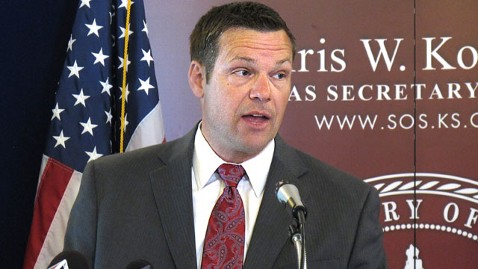Ariz Immigration Law Architect With Romney Ties Heads to Supreme Court

PHOTO: Kansas Secretary of State Kris Kobach discusses political redistricting issues during a news conference, April 23, 2012, in Topeka, Kan. (Image Credit: John Hanna/AP Photo)
Kris Kobach, a key drafter of Arizona's controversial immigration law, will be in Washington on Wednesday to hear the Supreme Court discuss the legality of the tough state measure that empowers local police to enforce federal immigration laws.
Kobach, who worked closely with former Arizona State Sen. Russell Pearce in crafting the 2010 law, said he stays in close touch with the Mitt Romney campaign. "My relationship has always been that I've been providing advice to either Romney or to his senior campaign officials. They can do with it what they wish. I have no formal role, just a person providing advice since the new year. I don't talk with Romney often, I email with his campaign quite frequently."
During a presidential debate in January, Romney, now the presumptive GOP nominee, said he supports the notion of "self-deportation" which he said is when "people decide they can do better by going home because they can't find work here because they don't have legal documentation to allow them to work here." The notion is a central part of the Arizona law .
The Romney campaign has described Kobach, who is currently serving as Kansas Secretary of State, as a "supporter" or an "informal advisor." Kobach is a longtime advocate for immigration reform. He is a former professor of constitutional law and previously served as chairman of the Kansas Republican Party and as former Attorney General John Ashcroft's chief advisor on immigration and border security while at the U.S. Department of Justice during the Bush administration.
The Obama administration is challenging Arizona's S.B. 1070, arguing that the Constitution gives the federal government authority to regulate immigration, and that the state law interferes with federal law.
Kobach rejects the challenge.
"The Supreme Court has said again and again that there is a role for the states to play. Congress is the primary actor in the field, but the states are permitted to act too, as long as Congress doesn't ask them to get off the field, " Kobach said in a recent interview.
Kobach says he and other drafters of the Arizona law worked to make sure that it mirrored federal law. "We knew full well that groups like the ACLU would want to challenge it so we drafted the law very carefully to avoid any conflict with federal law."
In court papers, Solicitor General Donald B. Verrilli Jr. writes, "Arizona seeks to enforce federal immigration law through means different from those Congress designated: it has criminalized acts that Congress has decided to punish only civilly; it has allowed county prosecutors to charge and incarcerate individuals for violations that the Executive Branch has decided not to pursue; and it has required state officers to take steps in the name of federal law enforcement without regard to the policies and priorities of the federal officials in whom Congress has vested enforcement authority."
At issue before the court is not the fiery issue of racial profiling, but the technical issue of "preemption."
"What preemption really means," says Elizabeth Stumpf, professor of Law at Lewis & Clark Law School, "is that when the Congress passes an immigration law, if there is a state or local law that conflicts with it, then the federal law is supreme. That's the Supremacy Clause of the Constitution."
Stumpf doesn't agree with Kobach's analysis of the Arizona law. She says, for example, in some instances the state law criminalizes behavior for conduct that the federal law does not, meaning it's not an example of "mirroring" federal law but creating a new kind of law.
"In fact, our immigration laws specify exactly how state and local law enforcement can work cooperatively with federal law enforcement. The Arizona law goes far beyond that," she says.
In an online statement released by the Romney campaign in January of 2012, Kobach and Romney endorsed each other. "Illegal immigration is a nightmare for America's economy and America's national security. Mitt Romney is the candidate who will finally secure the borders and put a stop to the magnets, like in-state tuition, that encourage illegal aliens to remain in our country unlawfully. He is also the candidate who will stand shoulder to shoulder with the states that are fighting to restore the rule of law. I am pleased to stand with this true conservative."
Romney said of Kobach, "With Kris on the team, I look forward to working with him to take forceful steps to curtail illegal immigration and to support states like South Carolina and Arizona that are stepping forward to address this problem."
In Pennsylvania on Monday, Romney appeared alongside Sen. Marco Rubio, R-Fla., a possible vice presidential nominee. Romney was asked about Rubio's proposed alternative to the Dream Act that would allow those who qualify to stay in the U.S to work or attend college by giving them a non-immigrant visa.
"I'm taking a look at his proposal," Romney said , "It has many features to commend it, but it's something we are studying."
Kobach says that he would reject Rubio's proposal if it were an amnesty. "It can't give lawful presence en masse to aliens unlawfully present. Lawful presence could mean a temporary visa, green card, citizenship, anything that gives the illegal alien what he has taken unlawfully."
Kobach said he has seen no details of the Rubio draft.
He also rejects the criticism that SB 1070 will lead to racial profiling. "Read the law," he says. "It expressly prohibits racial profiling . It says very clearly that it shall not be enforced with regard to a person's race, ethnic or national origin."